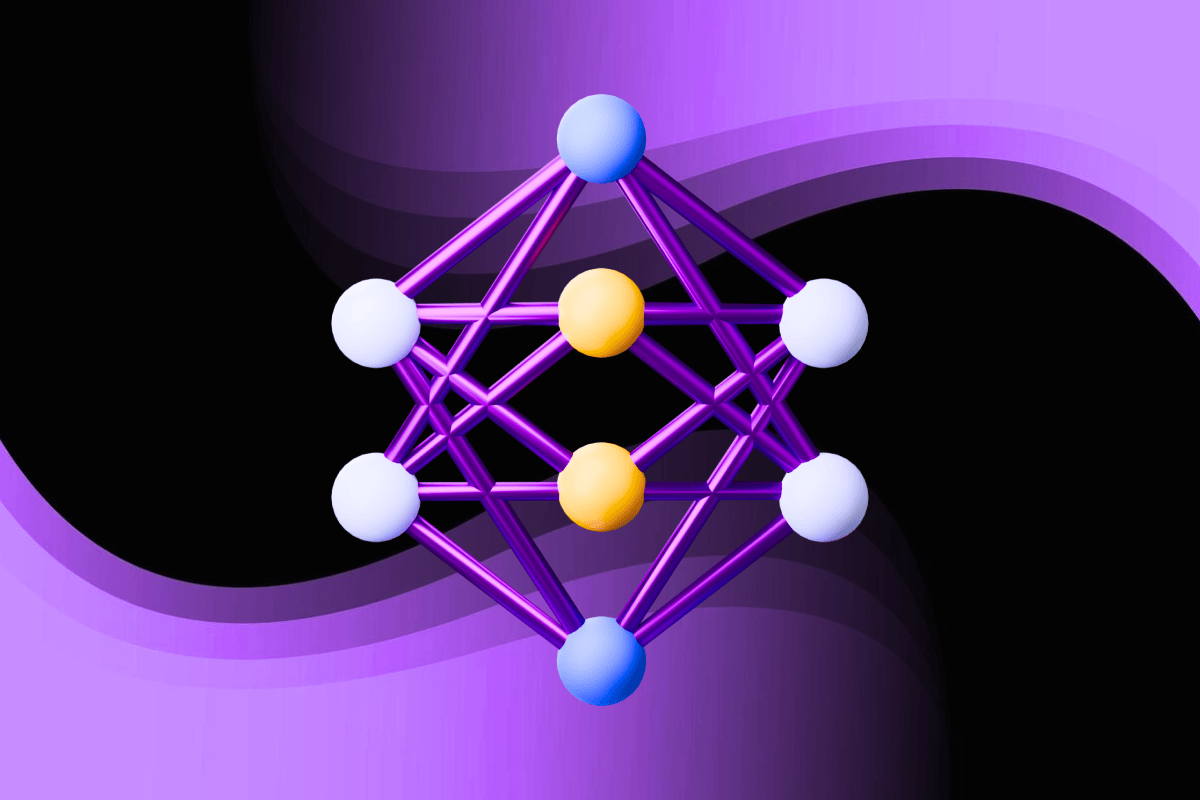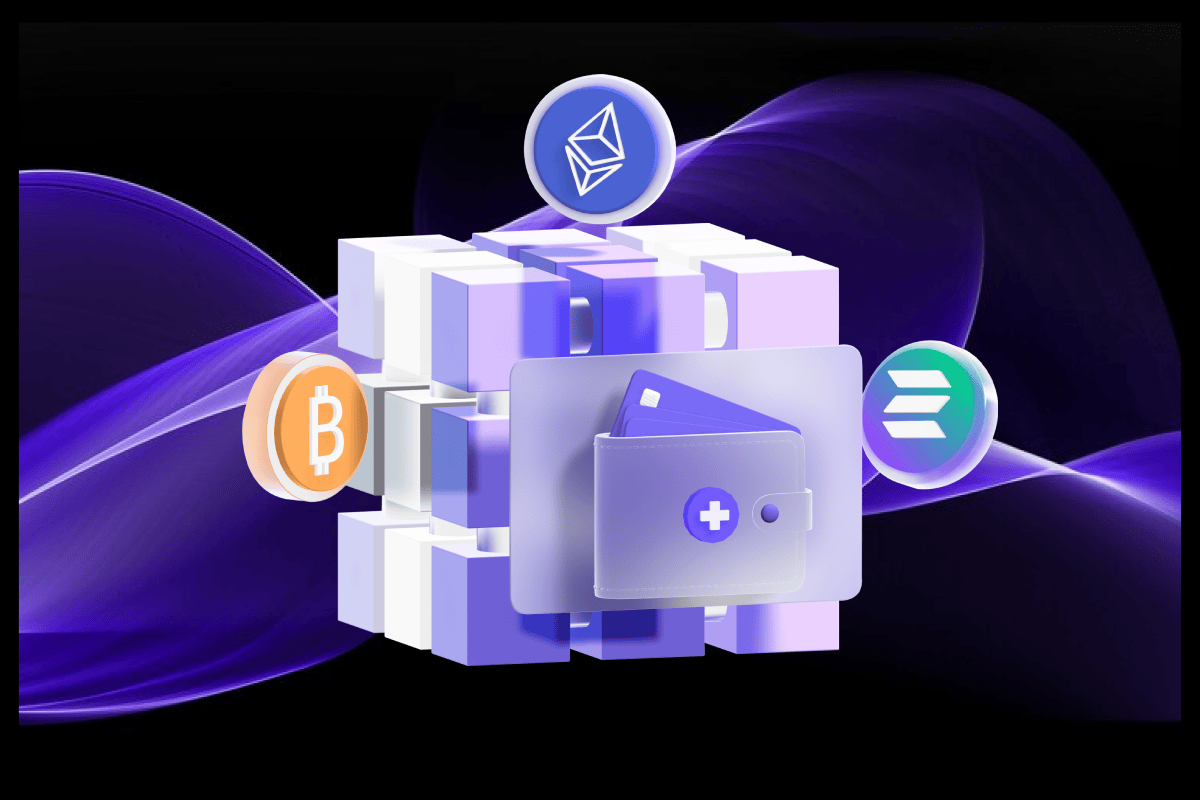SHARE THIS ARTICLE
Decentralized storage - Definition, Types, Process, Use Cases, Components
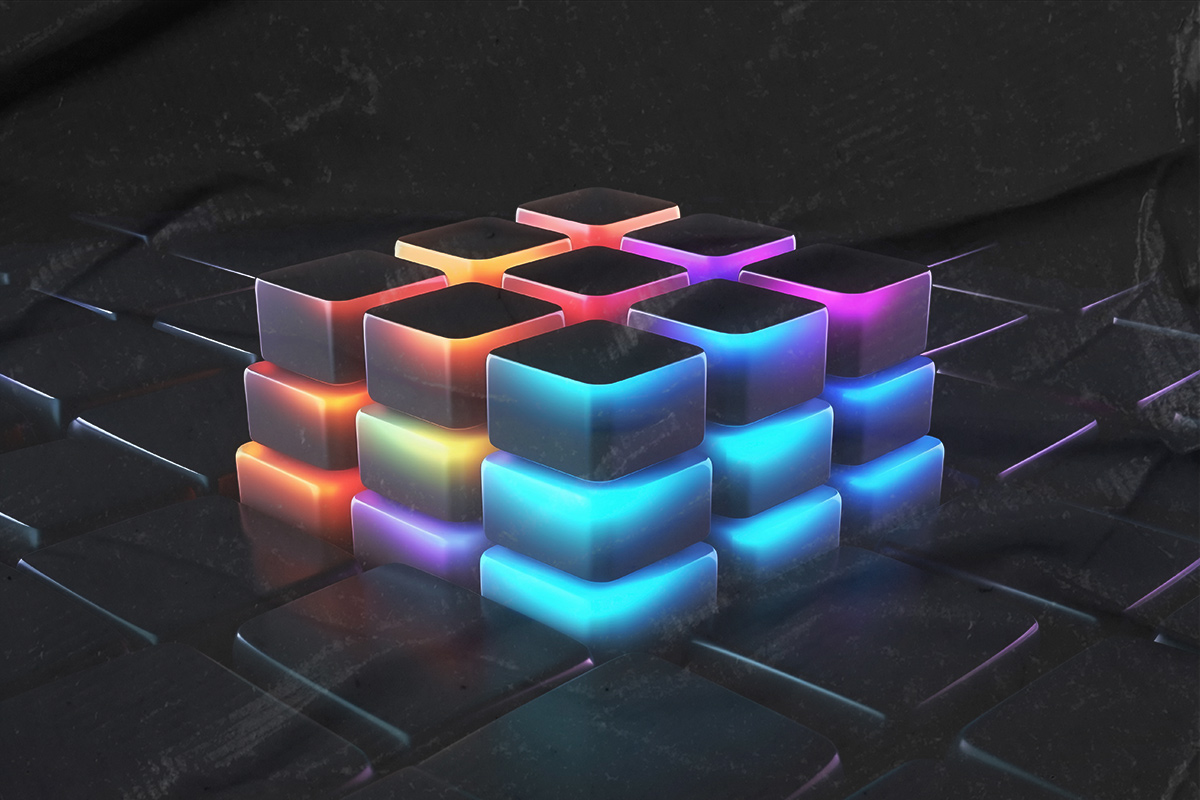
Data is one of the most valuable and abundant resources in the digital world. However, the way we store and access data is often inefficient, insecure, and centralized. Most of the data we generate and consume is stored on servers owned and controlled by large corporations or governments, which makes it vulnerable to hacking, censorship, or manipulation. Moreover, centralized storage systems are costly and prone to failure or downtime.
Understanding Decentralized Storage
Decentralized storage is an alternative approach that aims to solve these problems by distributing data across a network of independent nodes, rather than relying on a single or few centralized entities. Decentralized storage networks use various technologies, such as blockchain, distributed hash table, or IPFS, to enable peer-to-peer data sharing, verification, and encryption. This way, data is more secure, accessible, and resilient, as well as cheaper and more efficient.
The growing significance of decentralized storage is underscored by its ability to address pressing concerns associated with centralized storage solutions. The decentralization model not only enhances data security by eliminating single points of failure but also offers increased privacy and control over one's digital assets. As the volume of data continues to grow, the importance of decentralized storage in providing scalable and efficient solutions becomes increasingly evident.
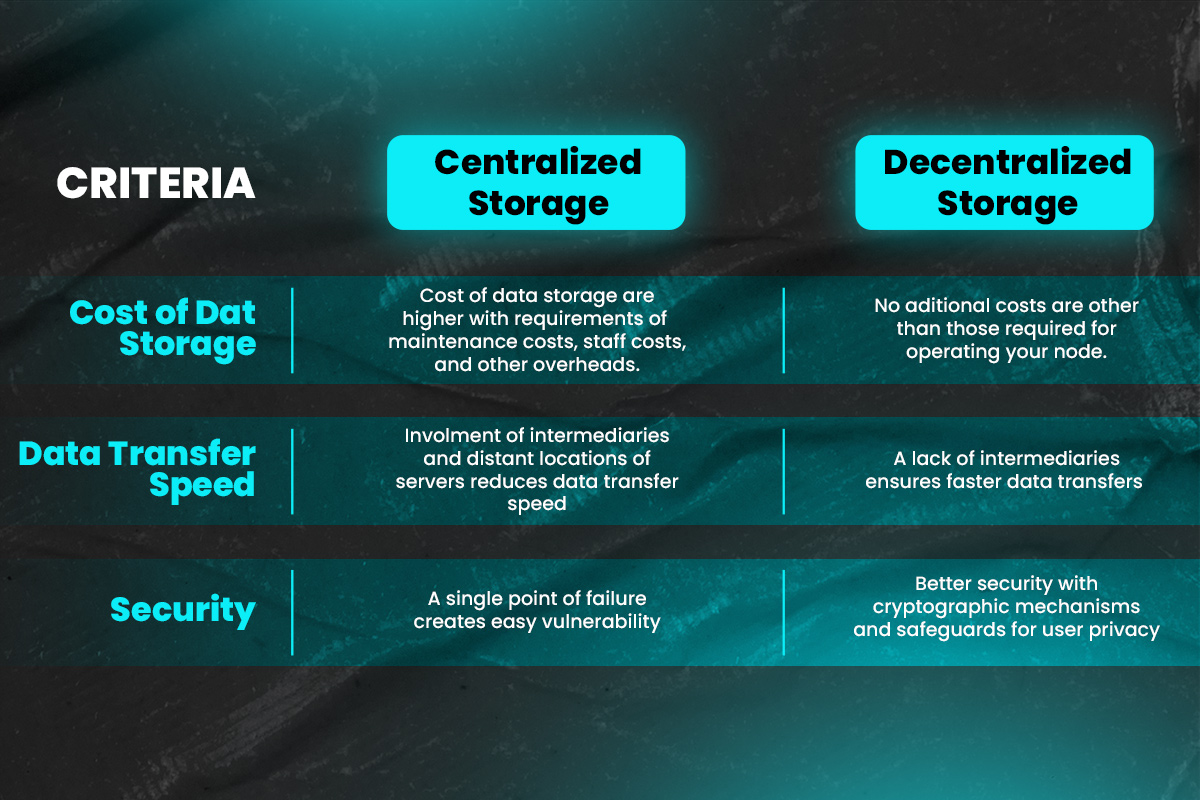
Types of Decentralized Storage
Decentralized storage can be classified into different types based on the underlying technology that enables data distribution and verification across the network.
Peer-to-Peer (P2P) Storage
Peer-to-Peer (P2P) storage is a decentralized storage model that relies on the collaborative effort of interconnected nodes, or peers, to store and share data. In this network, each participant has the dual role of a storage provider and a consumer, collectively contributing to the creation of a distributed storage ecosystem.
P2P storage operates on a distributed architecture where data is fragmented and stored across multiple nodes. When a user uploads data, it is broken into smaller pieces, encrypted, and distributed among peers. Retrieval involves accessing these pieces from various nodes, ensuring redundancy and resilience.
Advantages of P2P storage include increased data security, as there is no central point of failure and scalability through the collective storage capacity of all participants. However, challenges such as data consistency, the potential for slower retrieval times, and the need for incentivization mechanisms must be addressed for optimal functionality.
Distributed Cloud Storage
Distributed Cloud Storage combines the benefits of cloud computing with decentralization. Unlike traditional cloud storage, where data is stored in centralized servers, distributed cloud storage disperses data across a network of nodes, ensuring redundancy and fault tolerance
Noteworthy examples of distributed cloud storage providers include Storj, Sia, and Filecoin. These platforms allow users to rent out their excess storage space or purchase decentralized storage services, creating a dynamic and distributed storage ecosystem.
Benefits include enhanced privacy, lower costs, and increased data availability. However, challenges like potential security vulnerabilities and the need for widespread adoption must be addressed to unlock the full potential of distributed cloud storage.
Blockchain-based Storage
Blockchain, the foundational technology behind cryptocurrencies, has extended its influence to decentralized storage. A decentralized ledger that records transactions across a network of computers, blockchain ensures transparency, security, and immutability. Examples of blockchain-based storage platforms are Ethereum, Solana, and more.
Decentralized file systems, such as IPFS, leverage blockchain principles to create a distributed and content-addressable storage network. IPFS, for instance, replaces traditional URLs with content-based addresses, giving rise to a more efficient and resilient method of accessing and sharing data.
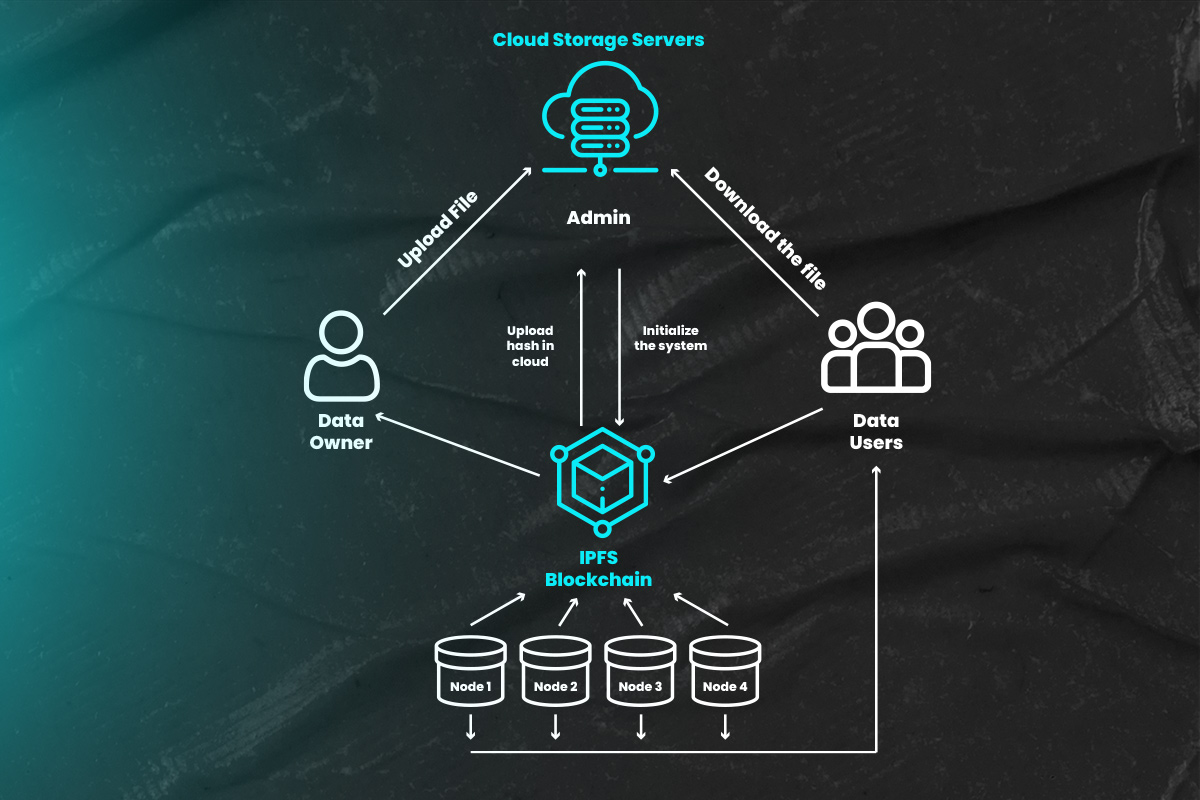
Smart contracts, self-executing agreements with terms directly written into code, play a pivotal role in blockchain-based storage. They automate processes, such as data retrieval and access permissions, improving the efficiency and reliability of decentralized storage solutions.
Pros of blockchain technology frameworks include enhanced security, data integrity, and transparency. However, challenges like scalability and the energy consumption associated with some blockchain networks need to be considered.
Process of Decentralized Storage
Decentralized storage networks use various technologies and protocols to store and retrieve data across a distributed network of nodes.
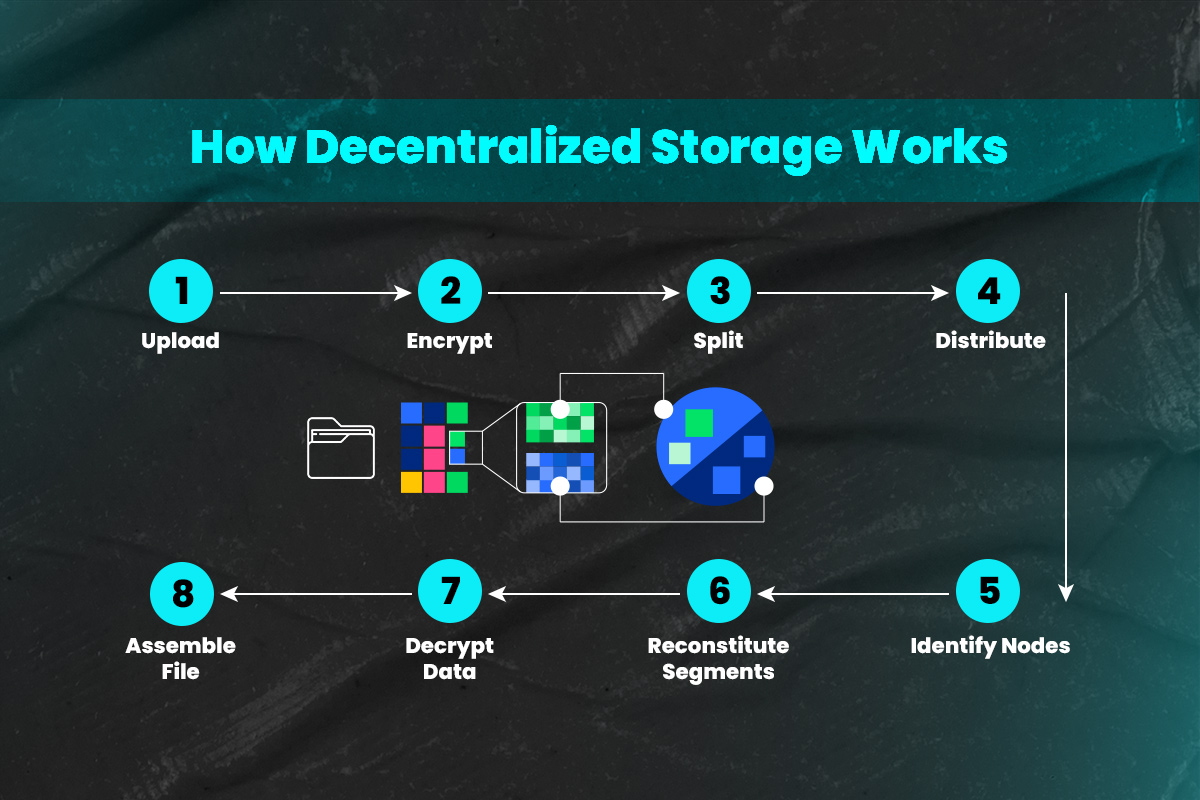
Data Encryption and Security
Before uploading data to a decentralized storage network, the data is encrypted with a private key that only the data owner has. This ensures the data is secure and confidential, and no one else can access or tamper with it. Encryption also protects the data from malicious attacks or censorship.
When it comes to decentralized storage, ensuring the confidentiality of data is extremely crucial. Various encryption techniques, including symmetric and asymmetric encryption, are employed to secure data during storage and transmission. The use of cryptographic hash functions further boosts data integrity.
Decentralized storage introduces innovative security measures to mitigate risks associated with centralized systems. With no single point of vulnerability, decentralized networks reduce the likelihood of large-scale data breaches. Moreover, users often retain control over their encryption keys, adding an extra layer of security.
Consensus Mechanisms
Consensus mechanisms are the backbone of many decentralized systems, as they ensure agreement among nodes in a network regarding the state of the system. Common consensus algorithms include Proof of Work (PoW), Proof of Stake (PoS), and Delegated Proof of Stake (DPoS), each with its unique approach to achieving agreement.
Consensus forking contributes significantly to data integrity in decentralized storage. By validating transactions or data modifications through a majority or all nodes, consensus ensures that only valid and authorized changes are accepted. This prevents malicious actors from tampering with stored data.
One of the prominent examples of consensus mechanisms in decentralized storage is Filecoin. It utilizes a novel Proof of Replication (PoRep) mechanism, which ensures that nodes store unique copies of data. Understanding these mechanisms is crucial for grasping how decentralized storage maintains data integrity in a trustless environment.
Data Distribution and Redundancy
To enhance efficiency and scalability, decentralized storage employs techniques like sharding, where large datasets are divided into smaller, more manageable parts. Each shard is then distributed across different nodes, minimizing the load on individual nodes and facilitating parallel processing. The nodes are usually incentivized by tokens or cryptocurrencies to store and serve the data. The distribution of the data is based on various factors, such as availability, proximity, reputation, or price. The network ensures that no single node has access to the entire data and that the data is evenly and randomly distributed.
Redundancy Strategies for Reliability:
Redundancy is a key strategy employed in decentralized storage to ensure data reliability. By storing multiple copies of data across diverse nodes, the system can withstand node failures or network disruptions. This redundancy strategy improves data availability and resilience against unforeseen challenges.
Decentralized storage systems incorporate fault tolerance mechanisms to ensure uninterrupted access to data even in the presence of node failures or network issues. Techniques such as erasure coding and distributed redundancy contribute to fault tolerance, due to which, the system remains operational and data remains accessible.
Retrieval
To retrieve the data from the network, the data owner or requester needs to have the private key and the hash of the data. The network then locates the nodes that have the shards of the data and downloads them. The network also verifies the authenticity and quality of the shards using the hash and consensus mechanisms. The data is then decrypted and reassembled using the private key.
Prominent Use Cases of Decentralized Storage
Decentralized storage, with its emphasis on security and efficiency, finds diverse applications across various industries.
Decentralized Finance (DeFi)
Decentralized Finance (DeFi) is at the forefront of leveraging decentralized storage. Smart contracts, powered by blockchain technology, facilitate automated and trustless financial transactions. Decentralized storage ensures the secure and immutable storage of financial data, leading to enhanced transparency and reduced risk of fraud.
Decentralized storage plays a crucial role in the tokenization of assets, converting real-world assets into digital tokens. These tokens represent ownership or value and are securely stored on decentralized networks. This paves the way for fractional ownership, liquidity, and efficient transferability.
Decentralized storage underpins the functioning of decentralized exchanges (DEXs). By storing transaction histories, order books, and user data on decentralized networks, DEXs ensure that users retain control over their assets while reducing the risks associated with centralized exchange vulnerabilities.
File Storage and Sharing
Decentralized storage solutions provide a secure and efficient alternative to traditional file hosting services. Users can store their files across a network of nodes, ensuring data privacy and reducing dependence on centralized servers. Projects like IPFS facilitate decentralized file hosting by breaking down files into smaller chunks distributed across nodes.
Collaborative editing platforms benefit from decentralized storage by allowing users to share and edit documents in a secure and transparent manner. With decentralized storage, multiple users can access and modify a document simultaneously, making real-time collaboration possible without compromising data integrity.
Furthermore, decentralized storage increases the capabilities of Content Distribution Networks (CDNs). By dispersing content across a decentralized network, CDNs can deliver faster and more resilient content to users globally. This reduces latency, improves scalability, and ensures a more robust content delivery infrastructure.
Internet of Things (IoT)
Decentralized storage addresses the unique challenges of data storage in the domain of the Internet of Things (IoT). With a growing number of IoT devices generating massive amounts of data, decentralized storage provides secure and scalable storage solutions, facilitating efficient data management for these interconnected devices.
Decentralized storage contributes to the security and scalability of IoT ecosystems. By distributing data across multiple nodes, the risk of a single point of failure is mitigated. Additionally, decentralized storage solutions can handle the increasing volume of data generated by IoT devices to ensure smooth and reliable operations.
Applications such as smart homes, industrial automation, and healthcare IoT systems benefit from decentralized storage. For instance, decentralized storage can secure and manage data from smart sensors in homes or facilitate secure and transparent health data sharing among interconnected healthcare devices.
Decentralized Storage Components
Decentralized storage systems consist of various components that work together to enable the storage and retrieval of data across a distributed network of nodes.
Nodes and Peers
Nodes form the backbone of decentralized storage networks, each playing a distinct role in maintaining the system. Primary node roles include storage nodes, responsible for storing and retrieving data; validation nodes - ensuring the integrity of transactions; and consensus nodes - facilitating agreement among network participants. The diversity of node roles contributes to the resilience and functionality of decentralized storage ecosystems.
Decentralized storage relies on peer-to-peer (P2P) communication, where nodes interact directly without intermediaries. P2P communication allows for efficient data transfer, as nodes collaborate to share and retrieve information. This direct communication minimizes latency, enhances system responsiveness, and contributes to the decentralized nature of the storage network.
Smart Contracts
Smart contracts play a pivotal role in decentralized storage, as they automate and enforce predefined rules to pave the way for transparent and tamper-proof execution of storage-related processes. In decentralized storage, smart contracts govern tasks such as data access permissions, rewards for storage providers, and automated data retrieval.
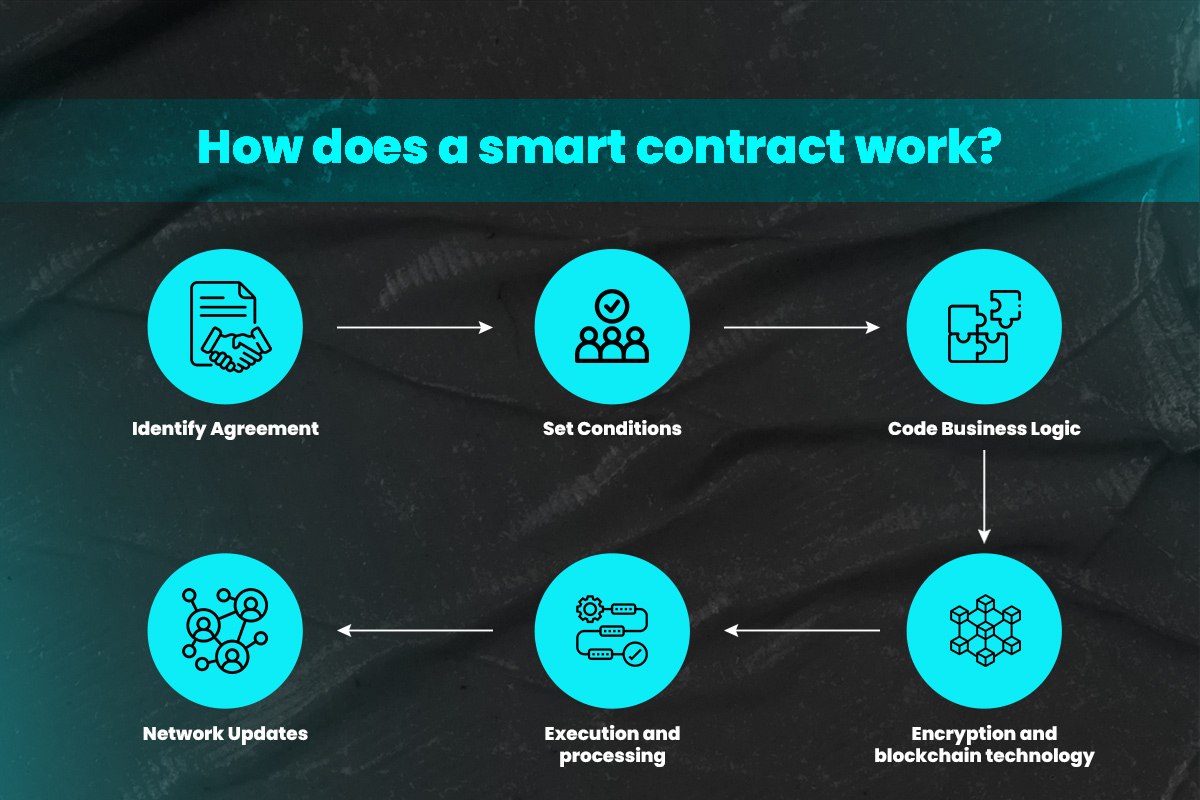
Decentralized Identifiers (DIDs)
Decentralized Identifiers (DIDs) are a foundational component for identity management in decentralized storage systems. DIDs provide a method for creating and verifying unique identifiers for individuals or entities participating in the network. This ensures that users retain control over their identities without relying on centralized authorities.
DIDs contribute significantly to the privacy and security of users in decentralized storage. By eliminating the need for centralized identity providers, DIDs reduce the risk of data breaches and identity theft. Users can manage their own identifiers, granting or revoking access as needed, boosting the overall security posture of the decentralized storage network.
Protocols
Protocols are the standards or rules that govern the communication and interaction between the nodes and the network. They can also specify the data formats, schemas, identifiers, or encryption methods that are used on the network. Protocols can be based on existing technologies, such as IPFS, IPLD, or Libp2p, or developed specifically for the network, such as Filecoin Protocol or Skynet Protocol.
Challenges and Future Trends
Decentralized storage has the potential to revolutionize the data storage industry. However, it also faces some challenges and limitations that need to be addressed and overcome. Moreover, it opens up new opportunities and possibilities for future developments and innovations.
Scalability Issues
Decentralized storage systems face scalability challenges as they strive to accommodate the increasing volume of data generated globally. As user adoption grows, it is essential that the network can efficiently scale without compromising performance. Innovations like sharding and optimized consensus algorithms are actively explored to address these scalability concerns and pave the way for decentralized storage to handle massive datasets seamlessly.
Interoperability Challenges
Interoperability, or the ability of different decentralized storage systems to effectively work together, remains a challenge. The existence of multiple protocols and standards can hinder cross-platform compatibility. Initiatives and standards, such as the Interledger Protocol (ILP) and the Decentralized Identity Foundation (DIF), aim to establish a common ground for interoperability, allowing decentralized storage systems to communicate and share data effectively.
Regulatory Considerations
The decentralized nature of storage systems raises regulatory considerations, particularly in terms of data protection, privacy, and compliance. As governments and regulatory bodies adapt to the decentralized paradigm, there is a need for clear frameworks that balance innovation with legal and ethical considerations. Decentralized storage platforms must confront these evolving regulatory environments to nurture trust and wider adoption.
Future Developments and Innovations
-
Enhanced Consensus Mechanisms: The evolution of consensus mechanisms will continue to be a focal point. Research and development are underway to create more efficient, secure, and environmentally friendly consensus algorithms. Concepts like Proof of Stake (PoS), Proof of Burn (PoB), and other novel approaches aim to improve the consensus process. This ensures data integrity while minimizing resource consumption.
-
Integration of Artificial Intelligence: The integration of artificial intelligence into decentralized storage systems presents exciting possibilities. AI algorithms can optimize data storage, retrieval, and distribution, enhancing the overall efficiency and performance of decentralized storage networks. This synergy between AI and decentralized storage aligns with the broader trend of incorporating machine learning into various technological domains.
-
Continued Blockchain Innovations: New blockchain platforms and protocols will emerge, offering improved scalability, faster transaction speeds, and enhanced security features. These developments will contribute to a more robust and adaptable infrastructure for decentralized storage systems.
-
Increased Adoption of Decentralized Identity Solutions: As data privacy and security become more urgent issues, people and businesses look for ways to have more control over their digital identities. Decentralized identity solutions, such as Decentralized Identifiers (DIDs), offer this possibility. They can change how personal information is handled and shared.
Wrapping It Up
The future of decentralized storage looks bright. Challenges like scalability and regulations are being tackled, paving the way for exciting developments. For instance, faster and more secure systems, smarter integration with artificial intelligence, and continued improvements in blockchain technology are on the horizon.
However, the widespread adoption of decentralized storage is still a point of concern. Education is the key here! It is essential to spread the word about the benefits of decentralized storage – improved security, more control over your data, and greater privacy. By making it user-friendly and integrating it into our applications, we can make decentralized storage the go-to solution for a safer and more transparent digital future.
Post Author

Explore Deep's insightful blog posts that help businesses stay ahead of the curve, explore new possibilities, and unlock the full potential of blockchain technology
Codezeros Blog: Decentralized Storage
Tap into the benefits of secure, accessible, and resilient data with decentralized storage. Decentralized storage resolves all the challenges posed by traditional data storage systems and we at Codezeros can help you integrate its potential into your applications.


